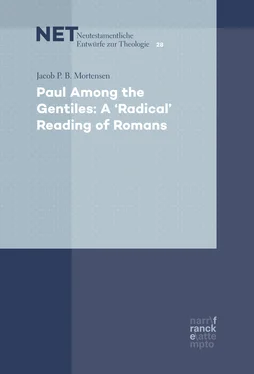1 ...6 7 8 10 11 12 ...26 Working my way forward from the radical perspective, I try to answer this question: Can we go beyond what has already (and repeatedly) been claimed by the contenders of the radical new perspective? I think we can. The primary contribution of my interpretation is to argue for a simpler and more coherent perception of Romans than has been previously developed. I will also argue from a comprehensive and exhaustive interpretation of Romans. I do not consider my interpretation to be a commentary on Romans, but I intend to work my way through all the parts of Romans. With this as my goal, I will try to meet the almost overwhelming task of commenting on all parts of Romans from the position of a radical stance on Paul. Even though many of the radical scholars have commented on several parts of Romans, I am not aware of anyone who has worked with Romans in its entirety, from chapter 1 to chapter 16; herein lies my work’s primary contribution. Another contribution concerns the interpretation of parts of Romans not yet commented on by the radicals, or drawing conclusions other than those drawn by the radicals ( e.g. Rom 5; 8; 9; 14–15). Another and more general contribution is the use of Romans – as read from my coherent, continuous, and comprehensive perspective – to evaluate the other Pauline letters.
All scholars working with Romans are aware of the multiple possibilities presented by The Romans Debate (1991), concerning the addressees, dating, situation, and purpose of Romans. I believe that my interpretation is simpler and more coherent than any previously presented. I came to this conclusion by way of a continuous and successive reading, from chapter 1 to chapter 16, in the framework of Paul’s Jewish background and his address to Gentiles. However, there will be objections to my interpretation, so I may as well present some of them here.
There will be disagreement concerning the addressees. My perspective takes Paul at his word when he claims to be apostle to the Gentiles (εἰμι ἐγὼ ἐθνῶν ἀπόστολος, Rom 11:13), and when he states that he was appointed apostle to the Gentiles, and Peter was appointed apostle to the Jews (Gal 2:7–9). From this basic supposition, I state that Paul addressed his gospel exclusively to Gentiles – also in Rome. This point of departure establishes my reading strategy. I find this supposition explicitly supported and substantiated in the first and fifteenth chapters of Romans, and in many of the chapters between them, and I find it challenged only in 2:17. Extending Runar Thorsteinsson’s work on Romans 2, I argue that in 2:17 Paul addresses a Gentile in the diatribe style, and that he continues to address a Gentile in the diatribe style all the way through to 11:36. Furthermore, I argue that Paul continuously addresses Gentiles in chapters 12 to 15 – also in chapters 14 and 15, concerning the ‘strong’ and the ‘weak’. My fundamental claim of a simpler interpretation supports this: If Paul addressed his message exclusively to Gentiles, and if he addresses a fictive Gentile in the diatribe style in chapters 2 to 11, then he also (and exclusively) addresses Gentiles in the paraenesis of chapters 12 to 15. If this interpretation may be substantiated and proved, then this interpretation is the simplest, and, hence, is to be preferred. This interpretation is also more coherent than previous interpretations because of the actual and immediate continuity of the discourse, from the theological exposition (1–11) to the paraenetic (12–15). The relevance of the theological exposition to the paraenesis will also be more conspicuous than in previous interpretations. Essentially, the paraenesis may be said to be firmly embedded in the theological exposition of the possible position of a Gentile believer. Hence, the unity of Romans – from chapter 1 to chapter 16 – will be confirmed.
Some will argue that there is a problem with certain ‘Jews’ in chapter 16, because Paul identifies them as kin or family (συγγενής). I will try to show that this argument has some weaknesses. Specifically, how are we to differentiate between Paul’s use of συγγενής in 9:3 and in chapter 16, if he qualifies the use in 9:3 with κατὰ σάρκα, but does not do so in chapter 16? Is there anything in chapter 16 that could indicate that Paul does not refer to historical-ethnic Jews in chapter 16 because he does not qualify them by way of κατὰ σάρκα, but uses συγγενής metaphorically to construct family ties with the assembly in Rome? I will try to show that there is.
In conclusion, there will be disagreements with many of my interpretive points. However, my interpretation operates with the premise that the most simple, unified, sequential, and coherent interpretation is to be preferred. And I will try to show this by way of a continuous and successive exegesis.
2 Terminology: Jews, Gentiles, Christians, or something else?
Introduction
In this introductory or preliminary chapter, I wish to draw attention to the question of terminology with respect to the radical perspective on Paul. I will not explore actual historical circumstances or texts in this chapter, but I will examine what other radical scholars have proposed as suitable designations for Paul’s addressees. The uniting characteristic of all these scholars is their attention to Paul’s addressees, and the firm conviction that Paul addressed non-Jews exclusively – the Gentiles.1 Radical scholars claim that, in particular, this would be Paul’s way of proclaiming Judaism. But how do we conceptualize this group of people who obviously attended some kind of Jewish gathering, led and founded by a Christ-believing Jew, living out, or practising, very Jewish ways of life and thought, without being actual Jews?
It seems as though scholars have always used the title of ‘Christians’ to identify Paul’s addressees.2 Sometimes, we even refer to the study of ‘Christian Origins’ or ‘Early (Formative) Christianity’ as what Paul engaged in. But from the perspective of a radical reading of Romans, some of the traditional terminology should be reconsidered to avoid misleading scholars to draw anachronistic or otherwise erroneous conclusions.3 The incentive to not draw anachronistic conclusions also works from perspectives other than the radical. But we must consider whether any descriptions work from an intrinsic perspective, and if none do, how we may most suitably redefine some of the traditional terminology. These reconsidered words and expressions may help us to better grasp what was going on in the mid-first-century Mediterranean world. The obvious reason for doing this is that nowhere does Paul designate his addressees as Christians;4 neither does he designate any group as Jewish–Christian or Gentile–Christian.5 Furthermore, he never speaks of himself as a Christian (χριστιανός).6 Consequently, if we continue to use these designations in our efforts to understand Paul in his historical setting, we reuse (and reinforce) politically powerful terms that are anachronistic and misleading. If we do not identify and draw attention to this aspect of our scholarly work, we may end up using these designations for contemporary needs in the formation of religious identities. Only by critically evaluating these designations can they help us to describe the Jewish and Greco-Roman society in which Paul moved.
The radical perspective argues that it would be more historically accurate to try to reach an understanding of the kind of Judaism Paul was concerned with in his letters, based on ancient Jewish uses of ‘Jew’ and ‘Judaism’, than to describe what he was doing with terms he never applied to himself or others. In extension of this, we should be aware of the fact that if Paul did not use a term that would distinguish his movement from Judaism, then he probably preached a form of Judaism, which included the incorporation of Gentiles qua non-Jews into Judaism. Thus, titles that would more fittingly describe the identities Paul navigates would be ‘Christ-believing Gentiles’ or ‘Gentiles-in-Christ’, even though the relation of these Gentiles to Judaism would be very vaguely illuminated by such a designation. The title, ‘Gentiles-in-Christ’ would also be an etic term, as differentiated from an emic one. Other and more nuanced possibilities have been proposed, especially by proponents of the radical perspective. I now turn to these. Essentially, the crucial task of determining terminology comes down to this: Which terms best describe the reality we try to grasp?
Читать дальше












